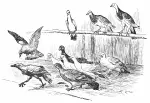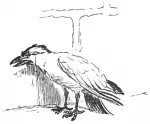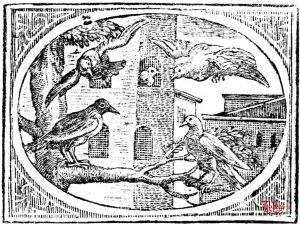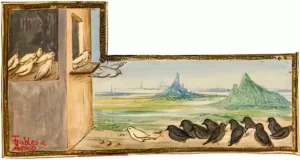A Jackdaw tries to be two things but fails at both. Too bad.
He that trims between two interests, loses him with both, but is true to neither.

Townsend version
A jackdaw, seeing some Doves in a cote abundantly provided with food, painted himself white and joined them in order to share their plentiful maintenance. The Doves, as long as he was silent, supposed him to be one of themselves and admitted him to their cote. But when one day he forgot himself and began to chatter, they discovered his true character and drove him forth, pecking him with their beaks. Failing to obtain food among the Doves, he returned to the Jackdaws. They too, not recognizing him on account of his color. expelled him from living with them. So desiring two ends, he obtained neither.

Caldecott
A Jackdaw observing how well cared for were the Doves in a certain dovecote, whitewashed himself and went to take a part in the same way of living. The Doves were friendly enough so long as he kept silence, taking him for one of themselves; but when he once forgot himself and gave a croak they immediately perceived his character, and cuffed him out. So the Jackdaw, having failed in getting a share of good things there, returned to his brother Jackdaws. But these latter not recognising him, because of his colour, kept him out of their mess also; so that in his desire for two things he got neither.

JBR Collection
A Jackdaw seeing how well some Pigeons in a certain Dove-cote fed, and how happily they lived together, wished much to join them. With this view he whitened his feathers, and slipped in one evening just as it was getting dark. As long as he kept quiet he escaped notice, but growing bolder by degrees, and feeling very jolly in his new quarters, he burst into a hearty laugh. His voice betrayed him. The Pigeons set upon him and drove him out. When he would afterwards have joined the Jackdaws again, his discoloured feathers and his battered state drew attention to him, and his former mates finding out what he had been at would let him have no further part with them.

Samuel Croxall
A JACK-DAW, observing that the Pigeons in a certain dove-cote lived well, and wanted for nothing, whitewashed his feathers, and endeavouring to look as much like a dove as he could, went and lived among them. The Pigeons, not distinguishing him as long as he kept silent, forbore to give him any disturbance. But at last he forgot his character, and began to chatter; by which the Pigeons discovering what he was, flew upon him, and beat him away from the meat, so that he was obliged to fly back to the jack-daws again. They not knowing him in his discoloured feathers, drove him away likewise, so that he who had endeavoured to be more than he had a right to, was not permitted to be any thing at all.
THE APPLICATION
The pretending to be of principles which we are not, either out of fear, or any prospect of advantage, is a very base, vile thing; and whoever is guilty of it, deserves to meet with ill treatment from all sorts and conditions of men. But the best of it is, there is no fear of such counterfeits imposing upon the world long, in a disguise so contrary to their own nature: let them but open their mouths, and, like the Daw in the fable, they immediately proclaim their kind. If they should deceive for a while, by appearing in an unquestionable place, or hanging out false colours, yet, if touched upon the right string, they would be discovered in an instant; for, when people are acting a wrong part, their very voice betrays them; they either cannot act their part sufficiently, or they overact it: and which ever is the case, a man of discretion and honour will be sure to distinguish, and to discountenance such pitiful impostors.

L’Estrange version
A daw took particular notice of the pigeons in such a certain dove-house, that they were very well fed, and provided for: so he went and painted himself of a dove colour, and took his commons with the pigeons. So long as he kept his own counsel, he pass’d for a bird of the same feather; but it was his hap once at unawares, to cry [Kaw,] upon which discovery, they beat him out of the house, and when he came to his old companions again, they’d have none of him neither; so that he lost himself both ways by this disguise.
Moral
He that trims betwizt two interests, loses himself with both, when he comes to be detected, for being true to neither..

Gherardo Image from 1480

Graculus et Columbae
Graculus, columbas bene nutritas in columbario quodam intuitus, ad eas dealbatum se contulit ut ipse quoque eiusdem cibi particeps esse posset. Ac illae quidem, donec ipse conticuit, columbam esse ratae, apud se recipere non recusarunt. Sed cum demum vocem, sui oblitus, emisisset ac proinde quis esset nosceretur, columbae eum inter verbera expulerunt. Tum ipse, spe earum cibi obtinendi frustratus, ad graculos rediit. Sed et illi, ob mutatum colorem eum minime agnoscentes, suo e consortio abegerunt atque ita contigit ut, duorum appetens, neutro potiretur.
Perry #129





